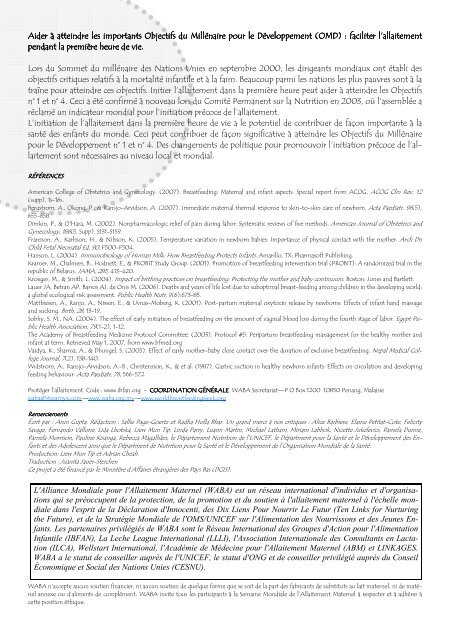Allait'info - Information pour l'allaitement
Allait'info - Information pour l'allaitement
Allait'info - Information pour l'allaitement
You also want an ePaper? Increase the reach of your titles
YUMPU automatically turns print PDFs into web optimized ePapers that Google loves.
Aider à atteindre les importants Objectifs du Millénaire <strong>pour</strong> le Développement (OMD) : faciliter l’allaitement<br />
pendant la première heure de vie.<br />
Lors du Sommet du millénaire des Nations Unies en septembre 2000, les dirigeants mondiaux ont établi des<br />
objectifs critiques relatifs à la mortalité infantile et à la faim. Beaucoup parmi les nations les plus pauvres sont à la<br />
traîne <strong>pour</strong> atteindre ces objectifs. Initier l’allaitement dans la première heure peut aider à atteindre les Objectifs<br />
n° 1 et n° 4. Ceci a été confirmé à nouveau lors du Comité Permanent sur la Nutrition en 2003, où l’assemblée a<br />
réclamé un indicateur mondial <strong>pour</strong> l’initiation précoce de l’allaitement.<br />
L’initiation de l’allaitement dans la première heure de vie a le potentiel de contribuer de façon importante à la<br />
santé des enfants du monde. Ceci peut contribuer de façon significative à atteindre les Objectifs du Millénaire<br />
<strong>pour</strong> le Développement n° 1 et n° 4. Des changements de politique <strong>pour</strong> promouvoir l’initiation précoce de l’allaitement<br />
sont nécessaires au niveau local et mondial.<br />
RÉFÉRENCES<br />
American College of Obstetrics and Gynecology. (2007). Breastfeeding: Maternal and infant aspects. Special report from ACOG. ACOG Clin Rev, 12<br />
(supp), 1s-16s.<br />
Bergstrom, A., Okong, P., & Ransjo-Arvidson, A. (2007). Immediate maternal thermal response to skin-to-skin care of newborn. Acta Paediatr, 96(5),<br />
655-658.<br />
Dimkin, P., & O'Hara, M. (2002). Nonpharmacologic relief of pain during labor: Systematic reviews of five methods. American Journal of Obstetrics and<br />
Gynecology, 186(5, Supp), S131-S159.<br />
Fransson, A., Karlsson, H., & Nilsson, K. (2005). Temperature variation in newborn babies: Importance of physical contact with the mother. Arch Dis<br />
Child Fetal Neonatal Ed, 90, F500-F504.<br />
Hanson, L. (2004). Immunobiology of Human Milk: How Breastfeeding Protects Infants. Amarillo, TX: Pharmasoft Publishing.<br />
Kramer, M., Chalmers, B., Hodnett, E., & PROBIT Study Group. (2001). Promotion of breastfeeding intervention trial (PROBIT): A randomized trial in the<br />
republic of Belarus. JAMA, 285, 413-420.<br />
Kroeger, M., & Smith, L. (2004). Impact of birthing practices on breastfeeding: Protecting the mother and baby continuum. Boston: Jones and Bartlett.<br />
Lauer JA, Betran AP, Barros AJ, de Onis M. (2006). Deaths and years of life lost due to suboptimal breast-feeding among children in the developing world:<br />
a global ecological risk assessment. Public Health Nutr, 9(6):673-85.<br />
Matthiesen, A., Ranjo, A., Nissen, E., & Uvnas-Moberg, K. (2001). Post-partum maternal oxytocin release by newborns: Effects of infant hand massage<br />
and sucking. Birth, 28, 13-19.<br />
Sobhy, S. M., NA. (2004). The effect of early initiation of breastfeeding on the amount of vaginal blood loss during the fourth stage of labor. Egypt Public<br />
Health Association, 79(1-2), 1-12.<br />
The Academy of Breastfeeding Medicine Protocol Committee. (2003). Protocol #5: Peripartum breastfeeding management for the healthy mother and<br />
infant at term. Retrieved May 1, 2007, from www.bfmed.org<br />
Vaidya, K., Sharma, A., & Dhungel, S. (2005). Effect of early mother-baby close contact over the duration of exclusive breastfeeding. Nepal Medical College<br />
Journal, 7(2), 138-140.<br />
Widstrom, A., Ransjo-Arvidson, A.-B., Christensson, K., & et al. (1987). Gastric suction in healthy newborn infants: Effects on circulation and developing<br />
feeding behaviour. Acta Paediatr, 76, 566-572.<br />
Protéger l’allaitement Code : www.ibfan.org - COORDINATION GÉNÉRALE WABA Secretariat—P O Box 1200 10850 Penang, Malaisie<br />
waba@streamyx.com—www.waba.org.my—www.worldbreastfeedingweek.org<br />
Remerciements<br />
Écrit par : Arun Gupta. Rédaction : Sallie Page-Goertz et Radha Holla Bhar. Un grand merci à nos critiques : Alice Barbiere, Elaine Petitat-Cote, Felicity<br />
Savage, Fernando Vallone, Lida Lhotska, Liew Mun Tip, Linda Parry, Luann Martin, Michael Latham, Miriam Labbok, Nicette Jukelevics, Pamela Dunne,<br />
Pamela Morrison, Pauline Kisanga, Rebecca Magalhães, le Département Nutrition de l’UNICEF, le Départment <strong>pour</strong> la Santé et le Développement des Enfants<br />
et des Adolescent ainsi que le Départment de Nutrition <strong>pour</strong> la Santé et le Développement de l’Organisation Mondiale de la Santé.<br />
Production: Liew Mun Tip et Adrian Cheah.<br />
Traduction : Juanita Jauer-Steichen<br />
Ce projet a été financé par le Ministère d’Affaires étrangères des Pays Bas (DGIS).<br />
L'Alliance Mondiale <strong>pour</strong> l'Allaitement Maternel (WABA) est un réseau international d'individus et d'organisations<br />
qui se préoccupent de la protection, de la promotion et du soutien à <strong>l'allaitement</strong> maternel à l'échelle mondiale<br />
dans l'esprit de la Déclaration d'Innocenti, des Dix Liens Pour Nourrir Le Futur (Ten Links for Nurturing<br />
the Future), et de la Stratégie Mondiale de l'OMS/UNICEF sur l'Alimentation des Nourrissons et des Jeunes Enfants.<br />
Les partenaires privilégiés de WABA sont le Réseau International des Groupes d'Action <strong>pour</strong> l'Alimentation<br />
Infantile (IBFAN), La Leche League International (LLLI), l'Association Internationale des Consultants en Lactation<br />
(ILCA), Wellstart International, l'Académie de Médecine <strong>pour</strong> l'Allaitement Maternel (ABM) et LINKAGES.<br />
WABA a le statut de conseiller auprès de l'UNICEF, le statut d'ONG et de conseiller privilégié auprès du Conseil<br />
Économique et Social des Nations Unies (CESNU).<br />
WABA n’accepte aucun soutien financier, ni aucun soutien de quelque forme que se soit de la part des fabricants de substituts au lait maternel, ni de matériel<br />
annexe ou d’aliments de complément. WABA invite tous les participants à la Semaine Mondiale de l’Allaitement Maternel à respecter et à adhérer à<br />
cette position éthique.


